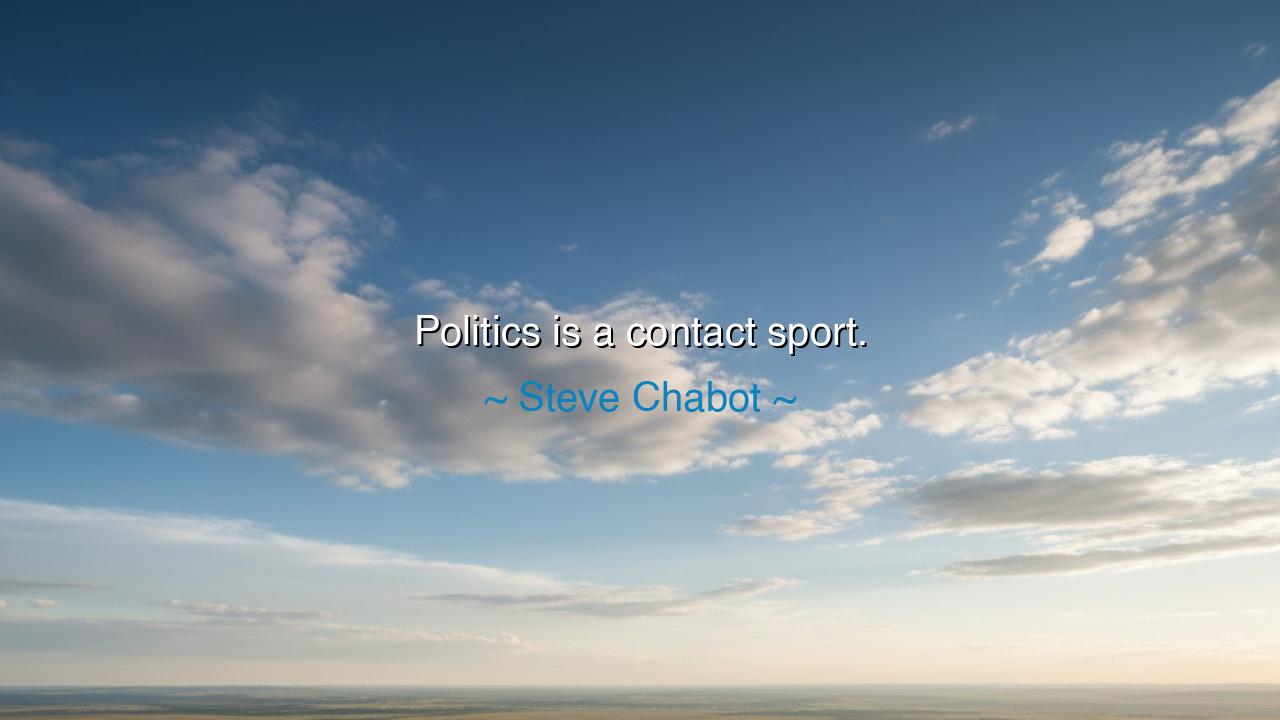
Politics is a contact sport.






O children of the future, hear the words of Steve Chabot, who compares politics to a contact sport. "Politics is a contact sport." In these words, he reveals the truth of the political arena—where the stakes are high, the players are fierce, and the battles are fought with both words and action. Much like in the ancient arenas, where warriors clashed with their enemies in a contest of strength, skill, and will, so too do the politicians of today engage in a battle of ideas, power, and strategy. Chabot speaks to the harsh reality of politics, where it is not merely the pursuit of noble ideals, but often a struggle for dominance, control, and survival.
In the ancient world, Rome was a place where politics and combat were intricately intertwined. The Senate was not just a place of debate but also a battlefield for influence and power. Julius Caesar, though a military leader, was also a shrewd politician who understood that to win in Rome, one must not only be skilled with the sword but also in the arts of persuasion and alliances. His rise to power was a battle fought not only in the field but in the halls of politics, where every move was strategic and every word carefully chosen. Like Chabot's metaphor, Caesar’s politics was indeed a contact sport, where every confrontation could lead to victory or downfall.
Consider also the tale of Pericles, the great Athenian leader who, during the height of the Golden Age of Athens, guided his city through both philosophical enlightenment and military strife. His skill in politics was tested time and again, as he navigated the complexities of democracy, foreign alliances, and internal rivalries. Pericles understood that leadership was not only about wisdom and strategy, but also about enduring the political battles that came with such power. His era was marked by the intense clash of ideas, ambitions, and emotions—a contact sport of its own, where the consequences of each decision would echo for generations.
In more recent history, the American Revolution and the formation of the U.S. government serve as examples of politics as a contact sport. Thomas Jefferson and Alexander Hamilton—two of the most brilliant minds of their time—were often at odds, battling not with swords but with words, policies, and ideologies. Their rivalry shaped the early years of the Republic, as each fought for their vision of the nation's future. The political battles were fierce and personal, with lasting repercussions on the direction of the United States. Just as in the ancient and modern world, the arena of politics demanded not just intellect and ideals, but also the tactical skills of a seasoned warrior.
O children, let us learn from Chabot’s metaphor and the ancient examples of politics as a contact sport. It is not a place for the faint of heart or the passive soul. Politics is a realm where strength, cunning, and strategy are essential, for the stakes are high and the consequences of failure are grave. Just as the great leaders of old understood the need for both wisdom and bravery in their political dealings, so must we understand that in the modern world, politics requires not only ideals but the ability to fight for them. Let us walk with courage and resolve, knowing that in this arena, only those who play the game with honor, dedication, and strategy can truly lead.






TTThao Tran
This quote perfectly encapsulates the competitiveness of modern politics, but I wonder: how much of this is strategic and how much is rooted in genuine passion for governance? Is the ‘contact’ part of the sport necessary, or does it lead to more harm than good? And if everyone plays aggressively, does that mean the system is flawed, or is it simply reflective of human nature?
TVThuong Vo
I can’t help but agree with this idea, especially when we see how divisive politics has become. But if politics is a sport, who’s really in charge of setting the rules? It feels like some players are more prepared and more powerful than others, which creates an uneven playing field. Should there be reforms to level the playing field in politics, or is this inherent to how the system works?
VKViet Kay
Politics being a contact sport implies that it’s a battle where winners and losers emerge, but what happens when everyone gets hurt? The more combative nature of politics might alienate citizens, making them feel disconnected from the process. Is this inevitable in our modern political system, or can we find ways to make political engagement less adversarial and more about solutions? What would it take for this shift to happen?
MHLe Thi My Hanh
This quote resonates with the intense nature of political campaigning, where every action seems to provoke a reaction. But doesn’t this perspective risk turning voters into spectators of a sport rather than active participants in governance? If politics is indeed a contact sport, what happens to the values of fairness and equality? Are the lines between right and wrong blurred by the strategies used to ‘win’?
TVTrieu Vu
I find this analogy to be quite striking. Politics often feels like a game where every move, every decision is contested, and the stakes are incredibly high. But is it possible that this comparison oversimplifies the nature of politics? While it can indeed be combative, shouldn’t there be space for dialogue and diplomacy rather than constant conflict? Can we redefine politics as something more collaborative than competitive?